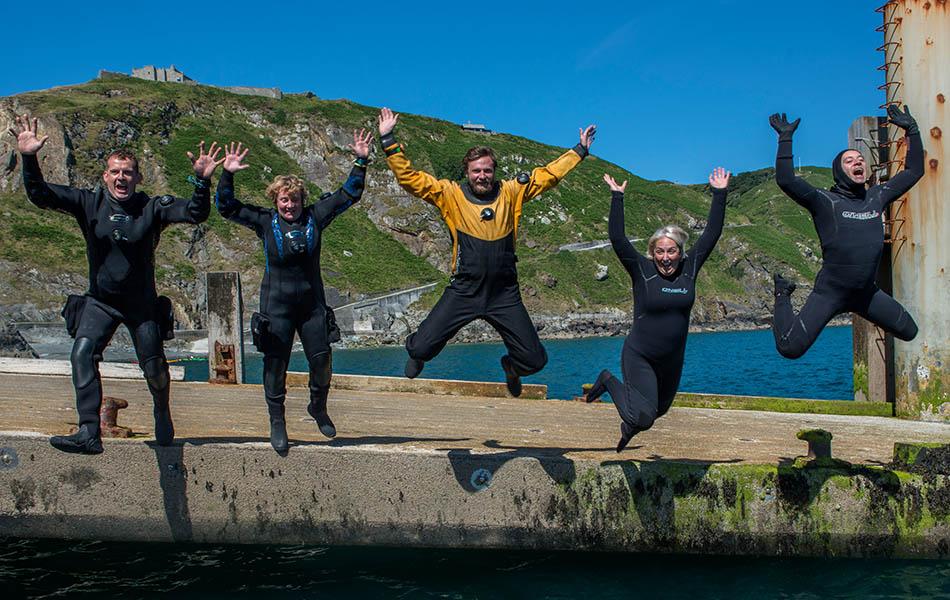
The water is starting to warm up and we're looking forward to going snorkelling around our beautiful UK coastline.
Finally, the water is starting to warm up and the recent sunshine has certainly made me want to get out and go Snorkelling – although I must wait another week or so before going to the coast.
With all the trip organisation including selecting a suitable safe snorkelling site in place, time spent thinking and planning how the snorkellers are to be managed both in and out of the water will be time well spent.
Whichever type of site is being planned, someone must take overall responsibility for the snorkel diving session and that person is the Snorkel Dive Manager (SDM). The role is to manage all the snorkel diving taking place, and any related activities such as launching boats if used. The SDM is appointed by the Diving Officer and serves as their deputy and carries their delegated authority for managing the safety of diving. The key to the SDM role is to ensure everything runs smoothly, is successful for all concerned and, above all, is as safe as possible.
- Marg Baldwin, Snorkel Instructor Trainer
Let’s talk about Snorkel Dive Management
Proper Snorkel Dive Management is key to the safety, and enjoyment, of any snorkel trip. Follow BSAC's safety and planning advice when snorkelling in the UK this spring and summer.
Snorkel Dive Management - Who, What, Where and When
- The Snorkel Dive Manager needs to know the level of the snorkellers, what snorkel dives are being planned and how many there are so that suitable buddy pairs can be organised.
- Deciding the suitable site is obviously influenced by the level of snorkeller e.g. trainees need a sheltered protected site with little or no tidal movement and very easy entry and exit points. The site conditions need to be assessed even before arrival on site such as the state of the tide, currents and how weather can affect the site.
- Access to the site should also be assessed and even more importantly a safe exit point(s). Is it easy to park cars, change and enter the water or does it mean moving equipment and people from where cars are parked to a suitable site near the water?
- Are there facilities that provide food and drink nearby or will the snorkellers have to take their own food and drink?
- What time to meet up or arrive at the site, it is important to know the best time to snorkel which may be dependent on the state of the tide. The state of the tide is also important if using a boat that will need to be launched and recovered.
Delegation when managing snorkel trips
- The Snorkel Dive Manager should not be expected to do everything! Although retaining overall control of the session, they should be able to delegate some of the work to others involved on the snorkel dive.
The role of the Assistant Dive Manager
- The role is to support the Snorkel Dive Manager in everything they do but as directed by the Snorkel Dive Manager. It may also involve liaising with others holding key roles such as the Cox’n if a boat is being used or the Equipment Officer, who may be responsible for providing the snorkellers with the kit being used on that session, such as SMBs or compasses.
- Taking the role of Assistant Snorkel Dive Manager is a great way to increase knowledge and understanding of different snorkel dive site conditions whether it is the features of a particular site or how different states of the tide can affect the in-water conditions; or how wind and waves can affect some sites more than others – e.g. underwater visibility.
Snorkelling Rescue Skills
- The need for rescue is rare but do occur and so an Assistant Snorkel Dive Manager also has an important role in the surface support team including the need to assist should a rescue situation arise.
- Anyone taking the role of Snorkel Dive Manager or Assistant Snorkel Dive Manager should be trained in Basic Life Support skills and ideally have confirmed their skills by qualifying as a Snorkel Life Saver or Advanced Snorkel Life Saver.
- Making sure the shore support team knows what to do should a rescue situation arise is a crucial factor in the overall safety of the activities.
Find out more about snorkel training.
Want to learn to snorkel or develop your snorkelling skills?
Send your postcode to membership@bsac.com and we'll help you find the right snorkelling club for you to train with. Or if you fancy a chat call us 0151 350 6226 (Mon - Fri, 9 - 5:30).

 Author: Marg Baldwin | Posted 09 May 2018
Author: Marg Baldwin | Posted 09 May 2018



